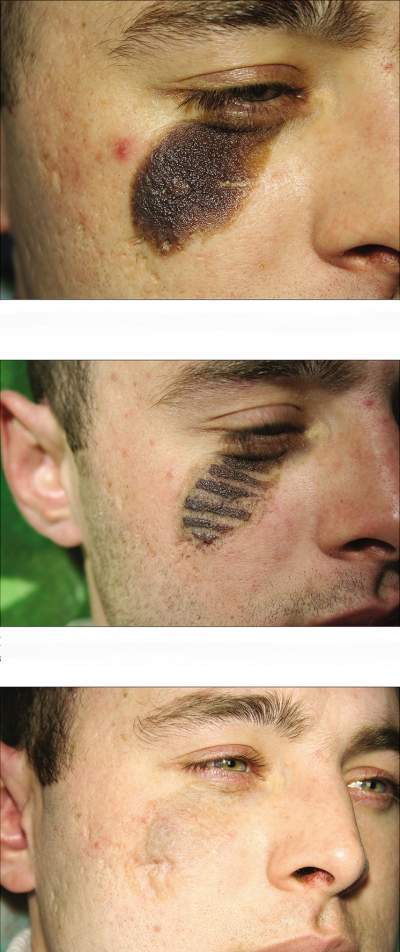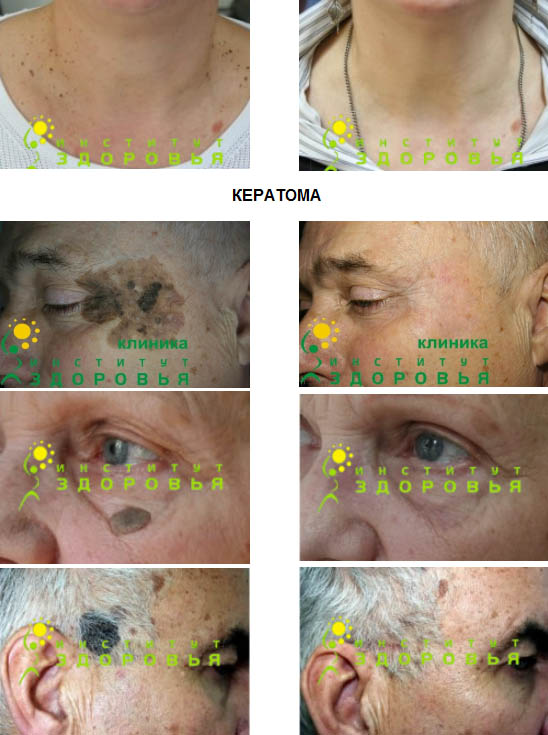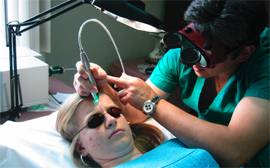Yachroma-Med Laser Treatment of Pigmented and Non-Pigmented Skin Lesions
The main advantage of laser therapy compared to conventional methods for
treating pigmented skin disorders is selective photothermolysis.
Selective photothermolysis provides selective thermal necrosis of
melanosomes without pronounced thermal deterioration of surrounding
cells and collagen structures. Therefore, an excellent cosmetic result
can be achieved with minimal risk of scar formation. The use of CVL
radiation, which corresponds to the high absorption of melanin at 511 nm
is efficient for the pigmented lesion's treatment. Each CVL pulse has a
duration of 20 nanoseconds and a peak power of up to several kW, to
provide the selective heating of pigmentation as an ideal laser. CVL is
an optimal treatment choice for seborrheic keratosis in terms of the
energy deposition depth and selectivity according to
Klyuchareva S. V., Ponomarev I. V., Topchiy S. B., Pushkareva A. E.,
Andrusenko Yu. N.Treatment of seborrheic keratosis with a copper vapour
laser. Vestnik Dermatologii i Venerologii. 2019;95(3):25–33.
Facial congenital melanocytic nevus represents a rare
condition with a prevalence of about 2%. As periorbital congenital
melanocytic nevus appears as a hyperpigmented plaque close to the eye,
it inevitably poses cosmetic problems. The dual-wavelength copper vapor
laser radiation at a wavelength of 511 nm which is highly absorbed by
melanin and radiation at 578 nm is mostly absorbed by hemoglobin, seems
to be
the most appropriate for the safe removal of periorbital congenital
melanocytic nevus.

See the paper
Ponomarev, I. V., Topchiy, S. B., Pushkareva, A. E.,
Klyuchareva, S. V., & Andrusenko, Y. N. (2021). Treatment of Congenital
Melanocytic Nevi With a Dual-Wavelengths Copper Vapor Laser: A Case
Series. Journal of Lasers in Medical Sciences,
https://journals.sbmu.ac.ir/jlms/article/view/28867/26609
Melanin
absorbs the radiation with a wavelength of 511 nm, 10 times more than
the radiation with 1064 nm wavelength. Hence, selective photodestruction
of melanosome with copper vapor laser requires less light energy than
the mid-infrared laser. The high absorption of 578 nm radiation by
oxyhemoglobin and hemoglobin as well as high absorption of 511 nm
radiation by melanin limits the penetration depth of the laser and
protects the underlying eye structures from injuries. See more
information at
Ponomarev IV, Topchiy SB, Andrusenko YN, Shakina LD. Treatment of
congenital melanocytic nevi in the periorbital area with dual-wavelength
copper vapor laser. Indian J Dermatol Venereol Leprol 2021;87:720-2.
Colour tattoos, which difficult for removing by alexandrite and ruby
lasers, respond to treatment with the yellow and green wavelengths of a
copper vapor laser.
Warts and HPV warts are also well treated. It is reasonable to use a
copper vapor laser when other less expansive treatment methods such as
cryotherapy, electrocautery, СО2 laser
provide poor results.
Copper vapor laser can be useful in the treatment of
facial epidermal nevi distributed along Blaschko’s line without
inflammatory signs. See the paper
Ponomarev IV, Topchiy SB, Kluchareva SV, Shakina LD. Epidermal nevus in
blaschkoid distribution treated with dual-wavelength copper vapor laser.
Indian J Dermatol Venereol Leprol 2021;87:718-20.

Фиброма
области лба до и после одного сеанса
лазеротерапии.
Вр Back to the top
|

